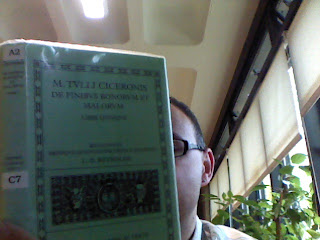I'm supposed to be writing a short piece about Hellenistic philosophy for a encyclopedia thing (called L'Antichità, I think). I've about ten pages to fill and the title I've been given is: 'Luoghi, modi e caratteristiche della filosofia ellenistica'. Fortunately, I can write it in English and they will translate.
I thought it wouldn't be too bad. After all, I often give introductory lectures to the period and have to say something general to orient students when they start. But now I'm thinking about it I'm not entirely sure what I'm going to say. I suppose in part the problem is because although I could say something about the period being characterised by dogmatic schools, each with a comprehensive philosophical account, and various sceptical adversaries. But I'm not sure that's particularly distinctive. A move to a kind of orthodoxy based on a founder's or some founders' views might be novel, but it seems to me that there is a lot of continuity between the classical and Hellenistic periods that is often overlooked. After all, things didn't all completely change the morning after Aristotle died. The Academy soldiered on, people continued reading and disagreeing about Plato, Theophrastus kept on looking at plants and stones and the like. Even the Epicureans can trace a lot of their philosophy to earlier ideas and, for my money, were just as interested in reading Plato (and perhaps Aristotle) as the other guys.
So I think I'm going to say that the big changes occurred as the period went on. Three hundred years later and philosophy has dispersed again from Athens across to centres around the Mediterranean including, most important of all, Roman Italy. The rise of philosophy in Latin and the influence of Rome politically and intellectually and probably the most interesting changes over these three hundred years.
Right. That's a line, at least. I'll give that one a go today.
Update: Look! Here I am thinking about some Hellenistic philosophy in the library, brought to you by the power of the wireless interweb.
I thought it wouldn't be too bad. After all, I often give introductory lectures to the period and have to say something general to orient students when they start. But now I'm thinking about it I'm not entirely sure what I'm going to say. I suppose in part the problem is because although I could say something about the period being characterised by dogmatic schools, each with a comprehensive philosophical account, and various sceptical adversaries. But I'm not sure that's particularly distinctive. A move to a kind of orthodoxy based on a founder's or some founders' views might be novel, but it seems to me that there is a lot of continuity between the classical and Hellenistic periods that is often overlooked. After all, things didn't all completely change the morning after Aristotle died. The Academy soldiered on, people continued reading and disagreeing about Plato, Theophrastus kept on looking at plants and stones and the like. Even the Epicureans can trace a lot of their philosophy to earlier ideas and, for my money, were just as interested in reading Plato (and perhaps Aristotle) as the other guys.
So I think I'm going to say that the big changes occurred as the period went on. Three hundred years later and philosophy has dispersed again from Athens across to centres around the Mediterranean including, most important of all, Roman Italy. The rise of philosophy in Latin and the influence of Rome politically and intellectually and probably the most interesting changes over these three hundred years.
Right. That's a line, at least. I'll give that one a go today.
Update: Look! Here I am thinking about some Hellenistic philosophy in the library, brought to you by the power of the wireless interweb.

No comments:
Post a Comment